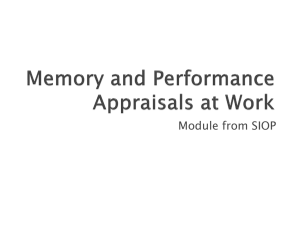Leadership-Conference-Presentation-Ian-Draper-Nov
advertisement
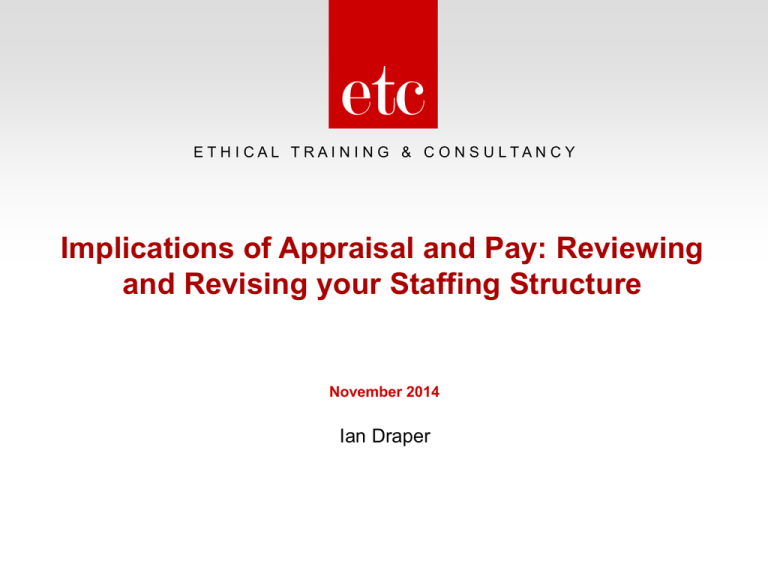
etc E T H I CAL T RAI N I N G & C O N S U LTAN C Y Implications of Appraisal and Pay: Reviewing and Revising your Staffing Structure November 2014 Ian Draper etc E T H I CAL T RAI N I N G & C O N S U LTAN C Y Contact Details jean.hemsley@ethicaltraining.com 07956 640196 ian.draper@ethicaltraining.com 07962 448848 www.ethicaltraining.com FAQ on facebook www.sene.org.uk Facebook: SENEtigray/SENEthiopia etc Session Plan The culture shift Pay Fairness and consistency Career stage performance expectations Revised career structures for teachers and leaders Restructuring timetable etc Changes to STPCD September 2013 21.1 The relevant body must consider annually whether or not to increase the salary of teachers who have completed a year of employment since the previous annual pay determination 21.2 The relevant body must decide how pay progression will be determined, subject to the following: The decision whether or not to award pay progression must be related to the teacher’s performance, as assessed through the school or authority’s appraisal arrangements in accordance with the 2012 regulations 21.3 The relevant body must set out clearly in the school’s pay policy how pay progression will be determined School Teachers’ Pay and Conditions Document 2013 etc The Culture Change – Pay and Appraisal Pay is no longer incremental The baseline for teachers and leaders is the maintenance of their pay point Appraisal is the record of performance Performance is assessed continuously throughout the year The appraisal statement is a “contract” and should be owned by the teacher Appraisal outcomes relate directly to pay and career outcomes © ETC 2013 etc Review of pay 2013 & 2014 – Requirements [key words] Simple Flexible Autonomy Recruitment Retention Remit letter to STRB April 2013 etc TLR 1 TLR 2 Excellent Teacher UPS Main Scale UQT Pay Inner London 2012/13 113,303 64.036 (A18) 62,640 61,392 60,993 12,393 48,600 45,483 44,540 (A1) 44,986) 7,323 6,197 Leadership 2,535 AST 29,088 27,249 25,410 23,571 21,731 19,893 36,387 33,865 31,446 29,889 28,408 27,000 45,000 43,536 41,497 etc 64,677 Leadership TLR 11 TLR TLR 2 TLR 3 Leading Practitioner UQT Pay Inner London 2013/14 113,303 45,450 UPR 44,986 44,986 12,517 41,912 6,259 Main Pay Range 29,379 27,522 25,665 23,807 21,949 20,092 36,751 34,204 31,761 30,188 28,693 27,270 7,397 2,500 500 2,561 etc 65,324 Leadership TLR 11 TLR TLR 2 TLR 3 Leading Practitioner UQT Pay Inner London 2015 114,437 44,905 UPR 45,436 45,436 12,643 42,332 7,471 37,119 27,543 20,293 Main Pay Range 29,673 6,322 2,551 511 2,587 etc STPCD 2014 Eight broad bands based on the existing HT groups and total unit scores Removing mandatory spine points Performance based progression No mandatory differentials, discretion for governing bodies Governing body determines how much room is appropriate for progression Individual pay range for Deputy and Assistant Heads set appropriate to the role with no prescribed room or differentials The current provisions relating to differential levels of payments for TLR posts within schools be removed, so schools are free to make appropriate decisions in the context of their needs etc Recommended Pay Ranges for Leadership 2014 England Minimum (AH’s and DH’s) Inner London Outer London 37,836 44,986 40,838 1 42,803 – 57,520 49,961 – 64,677 45,808 – 60,525 2 44,971 – 61,901 52,128 – 69,059 47,974 – 64,907 3 48,505 – 66,623 55,656 – 73,780 51,503 – 69,624 4 52,131 – 71,701 59,287 – 78,853 55,129 – 74,702 5 57,520 – 79,081 64,677 – 86,238 60,525 – 82,087 6 61,901 – 87,229 69,059 – 94,386 64,907 – 90,231 7 66,623 – 96,166 73,780 – 103,319 69,624 – 99,167 8 73,480 – 106,148 80,634 – 113,303 74,523 – 107,199 Broad Bands for HT’s Headroom for HT’s of multiple schools etc Appraisal: Teachers’ questions 1 Can you assure me that I will be treated fairly? [F] 2 What evidence will be used to assess my performance? [E] 3 How will my performance be assessed? [A] 4 What do I need to do to get pay progression? [P] [F] Fairness and Consistency [E] Evidence [A] Assessment [P] Pay progression © ETC 2013 etc Schools’ responses 1 Set career stage performance expectations [F] [E] [P] 2 Ensure appraisers are moderated and accountable [F] 3 Write standardised objectives for all teachers [F] [A] 4 Publish agreed sources of evidence available to all teachers [F] [E] [A] 5 Provide continuous assessment and feedback [A] 6 Develop new time limited job descriptions with performance criteria [F] 7 Start the appraisal cycle on 1st September [F] 8 Review the staffing structure and consider specialist appraiser team [F] [F] Fairness and Consistency [E] Evidence [A] Assessment [P] Pay progression © ETC 2014 etc Performance Expectations etc Career Stage Performance Expectations Describes the performance and behaviours expected at each career stage – Teachers and Leaders Teacher, Career stage 1 Teacher, Career stage 2 Teacher, Career stage 3 Teacher, Career stage 1 Leader, Assistant Head Leader, Deputy Head Leader, Headteacher Support Staff TA, Learning Mentor, Nursery Nurse Office Manager, Receptionist, Bursar Set out in part B (performance criteria) of a job description Assessed throughout the appraisal process © ETC 2014 etc Standards 3 and 4 - Quality of Teaching Demonstrates good subject and curriculum knowledge has a secure knowledge of the relevant subject(s) and curriculum areas, foster and maintain pupils’ interest in the subject, and address misunderstandings demonstrates a critical understanding of developments in the subject and curriculum areas, and promote the value of scholarship demonstrates an understanding of and take responsibility for promoting high standards of literacy, articulacy and the correct use of standard English, whatever the teacher’s specialist subject if teaching early reading, demonstrates a clear understanding of systematic synthetic phonics if teaching early mathematics, demonstrates a clear understanding of appropriate teaching strategies. (3) Plans and teaches well structured lessons imparts knowledge and develop understanding through effective use of lesson time promotes a love of learning and children’s intellectual curiosity sets homework and plans other out-of-class activities to consolidate and extend the knowledge and understanding pupils have acquired reflects systematically on the effectiveness of lessons and approaches to teaching contributes to the design and provision of an engaging curriculum within the relevant subject area(s). (4) etc CS 1 Teacher – Standards 3 & 4 (Quality of Teaching) - Performance Expectations Ensures that subject knowledge is thorough and is promoted in classes to engage the interests of students taught. Delivers well planned and structured lessons. Ensures that all students develop their skills as learners. Regularly sets homework in line with school policy. Marks homework and provides feedback to students. Develops other activities that extend students’ learning outside the classroom and their wider interests in the subject. Regularly reviews the success of lessons and provides formal lesson plans and evaluation of these plans as part of the departments QA processes. © ETC 2013 etc CS 2 Teacher – Standards 3 & 4 (Quality of Teaching) - Performance Expectations Is a source of updating student knowledge as well as supporting others in the way to update knowledge. Supports others in developing ways to encourage students to appreciate and be interested and engaged in the subject. Prepares and delivers consistently good and outstanding lessons. Is a role model for teachers in promoting students’ love of learning and their intellectual curiosity. Sets homework that is stimulating and fosters learning outside the classroom by incorporating innovative approaches. Shares with others how to gauge the impact of teaching and learning activities. Provides expertise and suggestions for improvement of the curriculum. © ETC 2013 etc CS 3 Teacher - Performance Expectations Has an awareness of school, national and international benchmarks and examination reports, including data from maintained and independent schools. Has an extensive understanding of and expertise in relevant assessment systems and examinations. Makes critical use of data, relating to the prior and current performance of pupils, to underpin and motivate improvement. Expectations are challengingly high, realistic, based on sound experience, and take into account the abilities of all pupils. Ensures that the pacing of lessons is well orchestrated and transitions between whole class teaching, group and individual work are seamless. Ensures that high quality assessment and feedback are consistently prompt, rigorous and constructive. Commands the classroom, skilfully leading, encouraging and extending pupils. Is analytical in evaluating and developing their own craft and knowledge, making full use of continuing professional development and appropriate research. Mentors pre-threshold teachers to reach threshold standards. Supports and monitors teachers whose performance needs to improve. © ETC 2013 etc CS 4 Teacher – Quality of Teaching Performance Expectations Establishes creative, responsive and effective approaches to learning and teaching. Monitors, evaluates and reviews classroom practice and promotes improvement strategies. Challenges underperformance in the classroom and ensures effective corrective action and follow-up. Is highly regarded by colleagues as a leader of stature rather than one who is dependant on their status. Exhibits outstanding teaching skills through their day-to-day work. Leads, through their day-to-day practice, outstanding quality of teaching for a team of teachers. Ensures that open, honest and regular conversations about performance take place across the school including reflecting with individuals and teams on lessons learnt when things go wrong and holding peers to account appropriately. Continually develops through coaching and mentoring, the quality of teaching, to deliver outstanding and sustainable classroom performance. © ETC 2013 etc AH Leader of Learning – Quality of Teaching - Performance Expectations Establishes creative, responsive and effective approaches to learning and teaching. Is highly regarded by colleagues as a leader of stature rather than one who is dependant on their status. Ensures that open, honest and regular conversations about performance take place across the school, including reflecting with individuals and teams on lessons learnt when things go wrong and holding peers to account appropriately. Takes a strategic role in the development of new and emerging technologies to enhance and extend the learning experience of students. Promotes and supports teachers to provide sufficient time for students to reflect on an assessment task and what they have learnt from it. Ensures that as a result of their learning experiences students: • exercise initiative in applying thinking skills critically and creatively to recognise and approach complex problems and make reasoned decisions; • understand and express ideas and information confidently and creatively; • work effectively and willingly in collaboration with others. © ETC 2013 etc Head Teacher – Quality of Teaching Performance Expectations Establishes creative, responsive and effective approaches to learning and teaching. Articulates characteristics of outstanding teaching and learning for students of all abilities. Demonstrates personal enthusiasm for, commitment to and understanding of, the learning process. Has a successful, proven track record of monitoring, evaluating and improving the quality of teaching and learning. Ensures the quality of all teaching is at least good with much that is outstanding. Initiates and supports research and debate about effective learning and teaching and develops relevant strategies for performance improvement. Acknowledges and celebrates outstanding teaching. Implements an appraisal system that secures early identification of teachers who need to improve and monitors and supports their improvement. Ensures there is a curriculum offer which values the talents and aspirations and which provides opportunities, inspires and energises all students. © ETC 2013 etc Teaching Assistant – Quality of Teaching Performance Expectations Offers constructive and timely suggestions as to the support provided to a planned learning activity. Agrees role in implementing the learning activity. Obtains information from the teacher about the teaching and learning objectives of the activity. Supports pupils in activities to develop their reading, writing, speaking/talking listening and numeracy skills. Offers the required types of support as and when needed by the pupils. Gives encouragement and feedback using language and vocabulary which the pupils are likely to understand. Provides the teacher with relevant feedback on the progress of the activity, the pupils’ response to the activity and progress in meeting learning targets. Demonstrates understanding of children’s preferred ways of communicating. Encourages children to use different communication methods. Models positive communication skills for children. Identifies the purpose of the display clearly. Devises the design and content of the display to maintain an appropriate balance between effective visual presentation and security of material. © ETC 2013 etc etc Teacher Career Stages responsibilities – an example for Career Stages 1-4 1. Taking responsibility for a minor subject area or project e.g. MFL, environmental education, as required by the school development plan. 2. Taking responsibility for a priority subject area or project e.g. PE, humanities, early years curriculum as required by the school development plan. 3. Taking responsibility for a major subject area or project, e.g. English, Maths, Science as required by the School Development Plan. 4. Leading a major subject or departmental area, e.g. English, Maths, and leading a team that has a significant impact on pupil progress and the quality of teaching. etc Primary School Pay and career pathways 2015/16? Teaching Career Stages Leadership HT 73,780 Classroom Teacher with minor subject or small project responsibility CS 1 Classroom Teacher with subject leadership (salary maximum incorporates TLR3 payment) Deputy Headteachers): •Teaching and Learning •EYFS, Day care and Extended services 55,000 55,656 48,450 AHT CS 4 Classroom Teacher with core subject leadership and or team responsibility CS 2 Classroom Teacher, exceptional practitioner and leader of pedagogy CS 3 DHT 66,103 Headteacher with limited operational role. Providing a check and balance on systems and processes. Assistant Headteachers: •Inclusion •KS1 •KS 2 41,500 30,188 All salaries are the maximum for the career stage etc Secondary School Pay and career pathways 2015/16? Teaching Career Stages Leadership HT 87,229 Classroom Teacher with minor subject or small project responsibility CS 1 Classroom Teacher with subject leadership (salary maximum incorporates TLR3 payment) Deputy Headteachers (3): •Teaching •Pupils •Curriculum 48,000 47,227 37,124 AHT CS 4 Classroom Teacher with core subject leadership and or team responsibility CS 2 Classroom Teacher, exceptional practitioner and leader of pedagogy CS 3 DHT 54,849 Headteacher with limited operational role. Providing a check and balance on systems and processes. Assistant Headteachers: (!4) •Appraisal (5) •Faculties (4) •KS including SENCO (5) 33,500 27,000 All salaries are the maximum for the career stage etc Timetable for Restructuring Autumn - Spring 2015 Nov 2014 Preliminary assessment of strengths and weaknesses of existing structure Jan 2015 Governors decide on a preferred staffing structure Consultation with staff and professional associations commences Feb 2015 Consultation concludes Governors agree staffing structure Mar 2015 Job descriptions written for new structure Staff given information of new structure and JD’s One to one meetings as requested Summer - Autumn 2015 Apr 2015 Staff invited to apply for posts in the new structures Work life balance policy and career break policy written Pay, Performance Management and CPD policies reviewed May 2015 Staff appointments confirmed Policies out for consultation July 2015 New policies in place New job descriptions in place Sept 2015 New structure in operation
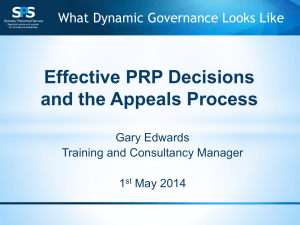
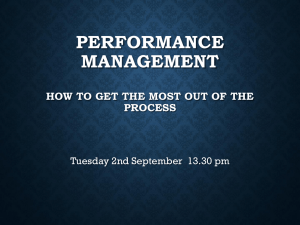


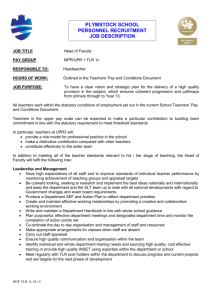
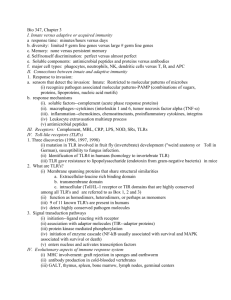


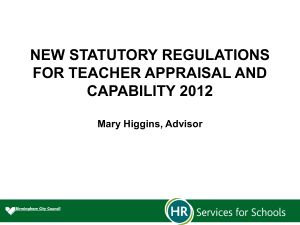
![afl_mat[1]](http://s2.studylib.net/store/data/005387843_1-8371eaaba182de7da429cb4369cd28fc-300x300.png)
